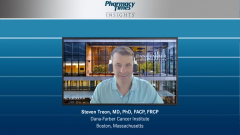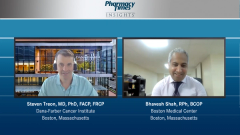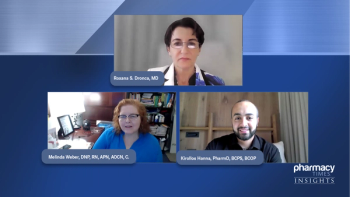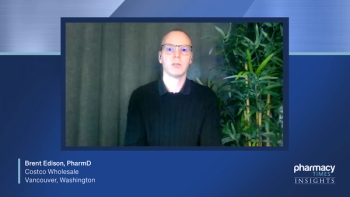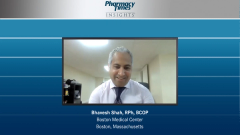
Therapies Under Investigation for Waldenström Macroglobulinemia
The exciting therapies in the pipeline that are thought to target novel mechanisms in Waldenström macroglobulinemia.
Episodes in this series

Bhavesh Shah, RPh, BCOP: We’ve covered everything on BTK inhibitors. Let’s briefly touch on some of the future agents and investigational drugs that you’re excited about in Waldenström macroglobulinemia. We have a BCL2 inhibitor and another exciting third-generation BTK inhibitor, LOXO-305, which seems to be really exciting. I don’t want to steal your thunder. I’m sure you have other drugs you want to talk about.
Steven Treon, MD, PhD, FACP, FRCP: Times are really exciting. What’s important is for our pharmacy colleagues to recognize that genomic-based biology is driving progress in this disease. High BCL2 levels are seen particularly among MYD88-mutated patients in their tumor cells. Venetoclax looks like it’s going to be a great drug. Our study was just accepted in the JCO [Journal of Clinical Oncology]. It’s online. In previously treated patients, we saw an 80% major response rate, and the median PFS [progression-free survival] in these patients was 30 months. It’s important to keep in mind that many patients already saw a BTK inhibitor, and the response levels were very similar. It gives us an option after a BTK inhibitor.
I mentioned earlier that CXCR4 is also a troublemaker. When you see CXCR4 in these patients, the time to response is longer. They don’t get the depth of response, and they progress sooner. They’re more at risk of getting BTK CS481 mutations and becoming resistant. We recently published our trial with ulocuplumab. It’s a CXCR4 antagonistic antibody. Even though it’s a small trial and you can read only so much into it, we showed that the response characteristics, including the PFS data, was what we would have expected with somebody who has CXCR4 wild type. It was truly modifying of the treatment response. We’re excited about the development of CXCR4 antagonist.
There’s also an oral antagonist, mavorixafor, against CXCR4 that’s in clinical trial. We reported some of the preliminary safety data at EHA [European Hematology Association Congress], and we had a little more on this at ASH [American Society of Hematology Annual Meeting].
Pirtobrutinib, which you mentioned, is a noncovalent BTK inhibitor. We’re excited about this drug because it gives us another option for somebody who develops a BTK CS481 mutation. My friend and colleague Michael Wang at [The University of Texas] MD Anderson [Cancer Center] did a very large study that included patients with Waldenström macroglobulinemia. They saw a 60% response rate among their patients with Waldenström who were treated with a BTK inhibitor. We’re doing a large trial validating those initial observations. We’re going to continue to be able to exploit these drugs. My colleague Jorge Castillo is combining ibrutinib and venetoclax. That’s a great trial. I also see zanubrutinib and BCL2 inhibitors coming together too. We’re going to be optimizing these drugs. It’s not just about bringing new drugs into the sphere. It’s optimizing them so we have a better effect on the disease.
Bhavesh Shah, RPh, BCOP: We continue to improve on BTK inhibitors, with the third-generation BTK inhibitor that you mentioned having an overall response rate of 60% and an adverse-effect profile that seems to be amazing compared with the current agents. From a pharmacist perspective and provider, having something that has minimal grade 3 or 4 toxicity, and maybe even grade 2, seems to be very tolerable. I’m excited to see these agents.
Steven Treon, MD, PhD, FACP, FRCP: I’m impressed with the lack of atrial fibrillation [AFib] that has also been seen with pirtobrutinib, or LOXO-305. The study numbers are still relatively small. We’re still in the hundreds, but it’s cool to see that there might be a difference in AFib too. It’s an exciting time. This is a great time to be in oncology. I’m sure for the next generation, it will be greater, but look at what all this basic science has taught us and continues to teach us.
Bhavesh Shah, RPh, BCOP: We’re out of time, so I want to thank you and our viewing audience. I hope you found this Pharmacy Times® Insights to be rich and informative.
Steven Treon, MD, PhD, FACP, FRCP: Likewise.
Transcript edited for clarity.
Newsletter
Stay informed on drug updates, treatment guidelines, and pharmacy practice trends—subscribe to Pharmacy Times for weekly clinical insights.

